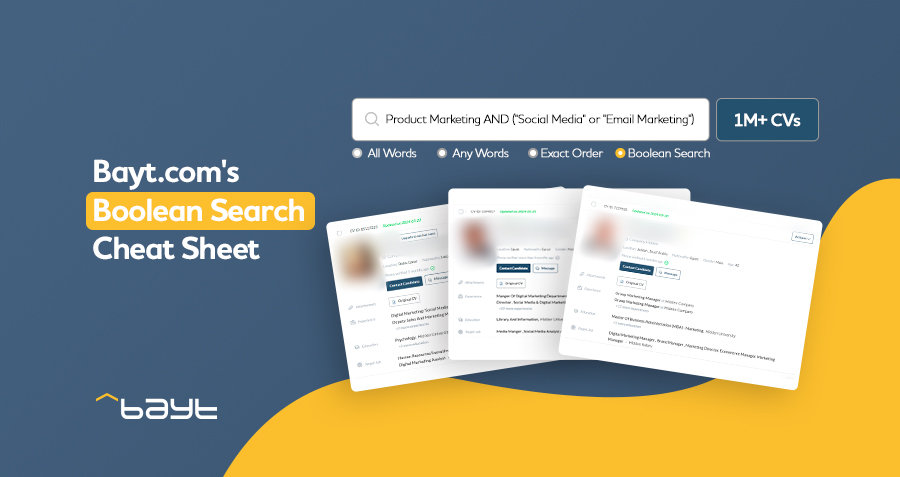![]()
Ready To Start Hiring?
Successful hiring starts with a simple step
Finding the right candidate in a pile of resumes can feel like searching for a needle in a haystack. As an employer, you need precise tools to streamline this process and ensure you are reaching the right talent. Traditional search tools often show too many irrelevant candidates, wasting valuable time and resources. That’s where Bayt.com’s Boolean Search cheat sheet comes in.
This blog will introduce you to a straightforward method for searching the CV database using a combination of keywords and three simple yet powerful operators: AND, OR, and NOT. These operators work together to fine-tune your search, ensuring that you retrieve only the most relevant CVs that match your precise job requirements. By using Boolean operators effectively, you can refine your search criteria and zero in on the candidates who truly fit your requirements.
With a database of over 50 million CVs, searching for the right fit became much easier. Let’s dive into these game-changing tactics for finding the right candidate with Bayt.com’s CV Search!
Understanding the core operators of the Boolean search on Bayt.com can significantly enhance your recruitment process. Let’s break down these essential tools:
Incorporating these operators effectively means you’re crafting a search that’s not just broad but also targeted—giving you a more refined list of potential candidates. Whether you include multiple must-have qualifications, offer alternatives for different suitable roles, or ensure certain experiences are excluded, these operators are the building blocks of a powerful, precision-driven search.
Let’s dive into a practical example to illustrate how to utilize the Boolean search feature on Bayt.com effectively. Suppose you’re in the market for a qualified ‘Project Manager’ or ‘Program Manager.’ However, your industry focus is not on construction; you need PMP certification candidates. To execute this search with precision, here’s what your query might look like:
By structuring your search with Boolean logic, you focus the database to return only those CVs that match all your specified criteria. This targeted approach streamlines the recruitment process, saving time and ensuring that the resumes you review are from individuals more likely to align with the role’s requirements.

Let’s look at another example:
| Operator | Purpose | Example | Results |
| AND | Narrows search by including all terms | Java AND Python | Retrieves resumes that mention both Java and Python |
| OR | Broadens search by including any terms | Java OR Python | Retrieves resumes that mention either Java or Python |
| NOT | Excludes terms from the search results | Java NOT Python | Retrieves resumes that mention Java but do not mention Python |
Let’s try using all operators in a single query:
| Query | Purpose | Example | Results |
|---|---|---|---|
| (Java AND Python) OR (C++ NOT C#) | Retrieves resumes that either mention both Java and Python, or mention C++ but exclude C# | (Java AND Python) OR (C++ NOT C#) | Retrieves resumes that either mention both Java and Python, or mention C++ but do not mention C# |
Remember, it’s about making the system work for you, helping you include the right experiences, exclude the non-relevant ones, and consider alternatives—all in one efficient query. This methodical approach to your search ensures that the resumes you receive are numerous and relevant, ticking all the boxes of your job description.
Employers are constantly seeking tools to streamline their hiring process. Boolean search, a seemingly simple yet effective feature on Bayt.com, stands out as a solution. It significantly benefits employers by enhancing search efficiency and improving the quality of candidate shortlists. Here’s why and how it transforms the recruitment experience:
Boolean search empowers employers to construct precise and sophisticated queries. Instead of sifting through an overwhelming influx of resumes, Boolean operators enable you to quickly narrow down the pool to help you find the right candidates. This focused search is not just about saving time; it’s about ensuring that every CV you review is more likely to match the job requirements closely.
According to a McKinsey report, high-skilled workers spend 19% of their time searching for and gathering information; Boolean search capabilities can significantly cut down this percentage by streamlining the recruitment process. Moreover, Boolean search enables you to search for multiple job titles or skills simultaneously, which is especially useful in fields where job titles vary widely but denote similar roles or skill sets. It provides flexibility and expands your reach without diluting the relevancy of the results. Therefore, this ensures that you get a diverse pool of talent to choose from.
In addition to providing targeted results, Boolean search boosts efficiency.
In conclusion, the boolean search for employers on Bayt.com has numerous benefits. It not only refines the recruitment process by providing highly relevant results but also offers a competitive advantage through increased efficiency. Therefore, boolean search is not just a feature—it’s a strategic asset in improving the recruitment process and finding your dream team!
Have some questions about Boolean Search? How can it help you? Talk to our experts and they’ll guide you without charge.
![]()
Successful hiring starts with a simple step